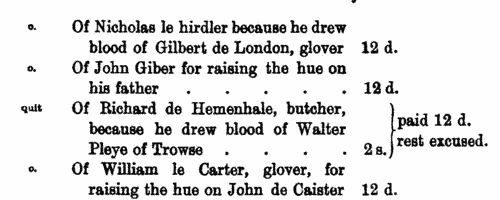Quell Surname Ancestry ResultsOur indexes 1000-1999 include entries for the spelling 'quell'. In the period you have requested, we have the following 3 records (displaying 1 to 3): Buy all | | | Get all 3 records to view, to save and print for £16.00 |
These sample scans are from the original record. You will get scans of the full pages or articles where the surname you searched for has been found. Your web browser may prevent the sample windows from opening; in this case please change your browser settings to allow pop-up windows from this site. Inhabitants of Norwich
(1288-1391)
Among the documents preserved in the record room of the Guildhall in the city of Norwich were 13 rolls connected with the leet courts in the city during the 13th and 14th centuries while the frankpledge system on which they were based was still in full operation. William Hudson, vicar of St Peter Permountergate in the city, prepared a copy of the earliest of these, from 1288, and extracts from the leet rolls of 1289, 1290, 1291, 1293, 1296, 1300, c1307, 1313, 1375 and 1391, and from an account of amercements in 1364, a tithing roll of Mancroft leet of 1311, and inquisitions before the bailiffs in 1350, and these were published by the Selden Society in 1892, with an English translation facing the extended Latin text. In 1288 there were four leets in the city - Conesford (North Conesford, South Conesford and Berstrete subleets), Manecroft (St Stephen, St Peter de Manecroft), Wymer or Westwyk (St Giles, St Gregory, St Andrew and St George), and Over the Water (St Michael and St Clement. Each leet had separate courts and separate records within the rolls. Hudson lists the main categories of items recorded as: murder, violent death, nuisances, weights, unwholesome food, larceny, assaults, hue and cry, being out of tithing, non-attendance at leet, purprestures, forestalling, unlawful trading, craft gilds, fraudulent work, and impleading in the Court Christian. QUELL. Cost: £4.00.  | Sample scan, click to enlarge

| Oxford householders
(1665)
Hearth tax was raised by assessing each householder on the number of chimneys to the dwelling. This provided a simple way to make a rough judgment as to the value of the dwelling. In Oxford the returns were made by ward, and then by parish. The return for 1665 (164/154) was edited by J. E. Thorold Rogers and printed for the Oxford Historical Society in 1891. The Roman numerals given are the numbers of hearths: where two or more people are grouped together with one number, it may be assumed that they were heads of separate households sharing a single building with that number of chimneys. Full names are given: only in a few instances is occupation given, nor are the streets indicated; however, there were thirteen ancient parishes in the city, none being very extensive, so a fairly good indication of location is given by the parish name.QUELL. Cost: £6.00.  | Sample scan, click to enlarge

| Masters of Merchantmen
(1785)
The Daily Universal Register of January 1785 includes a section entitled Ship News. This is compiled from reports from Portsmouth, Deal, Poole and Gravesend as to merchant shipping movements; news of losses and sightings coming in from various ports; a list of Ships Arrived in the (London) River, in the Clyde, in the Downs, in the Humber, in Bantry Bay, off Beachy Head, off Beer Haven, off Cape Clear, off Cape Fear, off Hastings, off Hilston, off Portland, off Porto Bar, off Scilly, at Alicante, Ancona, Antigua, Baltimore, Barbadoes, Belfast, Bilbao, Bonny, Bordeaux, Boulogne, Bremen, Brighthelmstone (Brighton), Bristol, Cadiz, Cape Breton, Cartagena, Charlestown, Chester, Constantinople, Cork, Corunna, Cowes, Creek, Crookhaven, Dantzig, Dartmouth, Dominica, Dover, Dublin, Exeter, Falmouth, Faro, Figuera, Genoa, Gibraltar, Gottenburg, Greenock, Grenada, Halifax (Nova Scotia), Havannah, Hoylake, Hull, Jersey, Killybegs, Lancaster, Leghorn, Leith, Limerick, Lisbon, Liverpool, Londonderry, L'Orient, Lowestoft, Madeira, Madras, Milford, Minorca, Mogador, Naples, New Calabar, New Providence (Bahamas), New York, Newry, Nice, Old Calabar, Oporto, Ostend, Peel, Penzance, Philadelphia, Piscatequa, Plymouth, Pondicherry, Port Roseway, Porto, Portsmouth, Rochelle, Ross, Rotterdam, St Kitts, St Lucia, St Michael, St Vincents, Savannah, Scarborough, Southampton, Tenerife, Texel, Tobago, Torbay, Vigo, Waterford, Whitehaven, and in 'Africa', Angola, Grenadoes, Honduras, the Isle of Wight, Jamaica, Maryland, New England, Newfoundland, Philadelphia and Virginia; and Reports of Ships made at the Custom House in London. Except in the home ports, the register refers only to British shipping: each ship is usually identified merely by its name, and the master's surname, although masters' christian names are given occasionally. Naval vessels are mentioned rarely, and their captains' names not usually stated. QUELL. Cost: £6.00.  | Sample scan, click to enlarge

|
Research your ancestry, family history, genealogy and one-name study by direct access to original records and archives indexed by surname.
|





